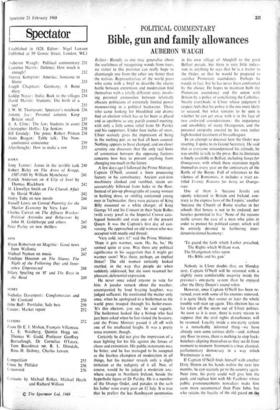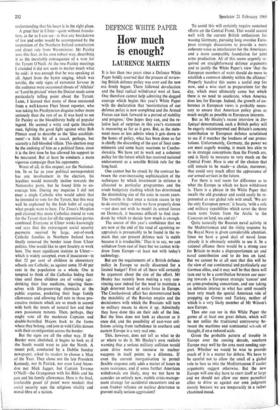Bible, gun and family allowances
POLITICAL COMMENTARY AUBERON WAUGH
Belfast—Blandly as one may generalise about the usefulness of recognising woods from trees, no visitor to this province can really hope to disentangle one from the other any better than the natives. Representatives of the world press who came with a brief to describe the classic battle between extremism and moderation find themselves with a totally different story, involv- ing personal animosities between relatively obscure politicians of extremely limited power manoeuvring in a political backwater. Those who came looking for bloodshed and drama find an election which has so far been as placid and as apathetic as any parish council meeting, with only a little comic relief from Mr Paisley and his supporters. Under four inches of snow, Ulster scarcely gives the impression of being in the melting pot, as we had all been assured.
Nothing appears to have changed, and on closer scrutiny one discovers that the only real bone of contention between the opposing factions concerns how best to prevent anything from changing too much in the future.
A few days ago I followed the Prime Minister, Captain O'Neill, around a linen processing factory in his constituency. Ancient cast-iron machinery clanked and rumbled, steam un- accountably billowed from holes in the floor.
Instead of pin-up photographs of young women in bathing dress, or smiling suntanned young men in Technicolor, there were pictures of King Billy mounted on a white charger, of King George VI and his Consort in their State Robes (with every jewel in the Imperial Crown cata- logued beneath) and even one of the present Queen. It was the Captain's first day of can- vassing. He approached an old woman who was occupied with needle and thread : 'Very cold, isn't it?' said the Prime Minister. 'Hope it gets warmer, soon. Ha, ha, ha.' He seemed quite at ease. Was there any political significance in his suggestion that it might get warmer soon? Was there, perhaps, an implied
threat? The old woman certainly looked startled, in the way that people- do when suddenly addressed, but she soon resumed her pleasant, deferential expression.
He never once asked anyone to vote for him. A jocular remark about the weather, accompanied by loud braying laughter, was judged sufficient. He mentioned the matter only once, when he apologised to a boilerman as the world press trooped through his boiler-room.
'It's this election, you see,' he said vaguely. The boilerman looked like a bishop who had
just been asked when he last visited the lavatory, and the Prime Minister passed it all off with one of his unaffected laughs. It was a pretty tense moment, though.
Certainly he did not give the impression of a man fighting for his life against the forces of chaos and extremism. His public statements may be bitter, and he has managed to be accepted as the fearless champion of moderation in all things, but his manner reveals only a slight irritation at the indignity of it all. Nor, of course, would he be judged a moderate any- where except in Northern Ireland, beside the hyperbolic figure of Dr Paisley. He is a member of the Orange Order, and parades in the sash his father wore every year on 12 July. It is true that he prefers the less flamboyant ceremonies in his own village of Ahoghill to the great Belfast parade, but there is very little indica- tion in anything he says that he is a traitor to the Order, or that he would be prepared to sacrifice Protestant ascendancy. Perhaps he would, in fact, but he has never been confronted by the choice. He hopes to maintain both the Protestant ascendancy and the union with Britain by a policy of conciliating the Catholics. Nearly everybody in Ulster whose judgment I respect feels that his policy is the one most likely to succeed, but what remains to be seen is whether he can get away with it in the face of two awkward considerations: the impatience and unsubtlety of many Orangemen, and the personal antipathy created by his own rather high-handed treatment of his colleagues.
In an attempt to discover how the Order was reacting. I spoke to its Grand Secretary. He said that as everyone misunderstood his attitude, he was unable to talk to the press. But its literature is freely available in Belfast, including Songs for Orangemen, with which these statesmen regale themselves every year on the anniversary of the Battle of the Boyne. Full of references to the vileness of Romanists, it includes a tract en- titled Twenty Reasons for being an Orange- man.
One of them is `because Jesuits are openly tolerated in Britain and Ireland, con- trary to the express laws of the Empire,' another 'because the Church of Rome teaches in her schools that heresy is not to be endured, nor heretics permitted to live.' None of the reasons really covers the case of a man who joins in order to protect his political career, which will be entirely devoted to furthering inter- denominational harmony : `To guard the faith which Luther preached, The Rights which William won, - The Orangeman relies upon His Bible and his gun.'
Nobody in Ulster doubts that, on Monday next, Captain O'Neill will be returned with a slightly more comfortable majority inside the province's one-party system than he enjoyed after the Dirty Dozen's round robin.
However, once Captain O'Neill has been re- turned, even with some of his enemies removed, it is quite likely that sooner or later the whole trouble will start up again. This election has so far taken all the steam out of Ulster politics. As soon as it is over, there is every reason to suppose that the civil rights disturbances will be resumed. Loyalty inside a one-party system is a remarkably informal thing—we have already seen some curious shifts—and, without any floor to cross, there is nothing to stop back- benchers aligning themselves as they see fit from moment to moment. Stormont is a true, classical, parliamentary democracy in a way which Westminster is not.
If Captain O'Neill finds himself 'with another Dirty Dozen on his hands within the next few months, he can scarcely go to the country again. Next time, his party could well give him the push, and replace him with Mr Faulkner whose public pronouncerhents nowadays make him seem more oecumenical than Pope John, but who retains the loyalty of the old guard on the understanding that his heart is in the right place.
A great fear in Ulster—quite without founda- tion, as far as I can see—is that any breakdown of law and order would be accompanied by the suspension of the Northern Ireland constitution and direct rule from Westminster. Mr Paisley uses this fear, in his own robust way, describing it as the inevitable consequence of a vote for the Tyrant O'Neill. At the two Paisley meetings I attended it did not seem to matter much what he said: it was enough that he was speaking at all. Apart from the hymn singing, which was terrific, the only signs of extremist fervour in the audience were occasional shouts of 'Alleluia' or 'Lord be praised' when the Doctor made some particularly telling point about the Tyrant. Later, I learned that many of these emanated from a well-known Fleet Street reporter, who was taking his Presbyterian disguise rather more seriously than the rest of us. It was hard to see Dr Paisley as the bloodthirsty bully of popular legend. He seemed a witty and quite likeable man, fighting the good fight against what Bob Pitman used to describe as the 'lilac establish- ment'—a little bit of a rascal, perhaps, but scarcely a full-blooded villain. This election may be the undoing of him as a political force, since it is the first time he has allowed his support to be measured. But at least he conducts a more vigorous campaign than his opponents.
Worst of all, in this respect, are the National- ists. In so far as your political correspondent has any involvement in the election, his loyalties would naturally incline towards the Nationalist party, but he found little to en- courage him. During my inquiries I did not meet a single Catholic who would admit that he intended to vote for the Tyrant, but this may well be explained by the Irish habit of saying what people want to hear. The Times's Marplan poll claimed that more Catholics intend to vote for the Tyrant than for all the opposition parties combined. Everyone in Ulster winks knowingly and says that the extravagant social security payments received by large, out-of-work Catholic families in Northern Ireland have finally removed the border issue from Ulster politics. One would like to spot Jesuitry at work here. The most significant statistic in Ulster— which is widely accepted, even if inaccurate—is that 52 per cent of children in elementary schools are Catholic, as against some 35-40 per cent in the population as a whole. One is tempted to think of the Catholics biding their time until these children are of voting age: drinking their free medicine, injecting them- selves with life-preserving chemicals at the public expense, pocketing their huge family allowances and allowing full rein to those pro- creative instincts which are so much in accord with both the tenets of natural law and their own passionate natures. Then, perhaps, they might vote all the moderate Captains and double-barrelled Majors back to the farms where they belong, and join in wild Celtic dances with their co-religionists across the border.
But the signs are all the other way. If the Border were abolished, it begins to look as if the South would want to join the North. A recent poll, conducted by a Dublin Sunday newspaper, asked its readers to choose a Man of the Year. They chose not the late President Kennedy, nor St Patrick, nor even Lord Snow- don nor Mick Jagger, but Captain Terence O'Neill—the Orangeman with his Bible and his gun and his family allowances. Here is the final, irrefutable proof (if proof were needed) that social security saps the religious vitality and moral fibre of a nation.



































 Previous page
Previous page